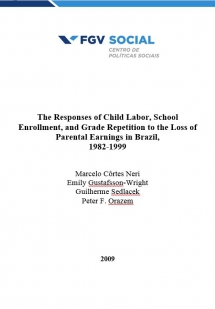
The Responses of Child Labor, School Enrollment, and Grade Repetition to the Loss of Parental Earnings in Brazil, 1982-1999 - Neri, Marcelo Cortes, Gustafsson-Wright, Emily, Sedlacek, Guilherme, Orazem, Peter F.
Sobre o paper:
ABSTRACT
This paper evaluates the long-run effects of economic instability. In particular, we study the impact of idiosyncratic shocks to father’s income on children’s human capital accumulation variables such as school drop-outs, repetition rates and domestic and non-domestic labor. Although, the problem of child labor in Brazil has declined greatly during the last decade, the number of children working is still substantial. The low levels of educational attainment in Brazil are also a main cause for concern. The large rotating panel data set used allows for the estimation of the impacts of changes in occupational and income status of fathers on changes in his child’s time allocation circumstances. The empirical analysis is restricted to families with fathers, mothers and at least one child between 10 and 15 years of age in the main Brazilian metropolitan areas during the 1982-1999 period. We perform logistic regressions controlling for child characteristics (gender, age, if he/she is behind in school for age), parents characteristics (grade attainment and income) and time and location variables. The main variables analyzed are dynamic proxies of impulses and responses, namely: shocks to household head’s income and unemployment status, on the one hand and child’s probability of dropping out of school, of repeating a grade and of start working, on the other. The findings suggest that father’s income has a significant positive correlation with child’s dropping out of school and of repeating a grade. The findings do not suggest a significant relationship between a father’s becoming unemployed and a child entering the non-domestic labor market. However, the results demonstrate a significant positive relationship between a father becoming unemployed and a child beginning to work in domestic labor. There was also a positive correlation between father becoming unemployed and a child dropping out and repeating a grade. Both gender and age were highly significant with boys and older children being more likely to work, drop-out and repeat grades.
REFERENCES
This paper was published in:
Book
NERI, Marcelo C.; GUSTAFSSON-WRIGHT, Emily; SEDLACEK, Guilherme; ORAZEM, Peter F. The Responses of Child Labour, School Enrollment, and Grade Repetition to the Loss of Parental Earnings in Brazil, 1982-1999. In: Peter F. Orazem; Zafiris Tzannatos; Guilherme Sedlacek. (Org.). Child Labor and Education in Latin America. : Palgrave Macmillan, 2009.
Site
NERI, Marcelo C.; GUSTAFSSON-WRIGHT, Emily; SEDLACEK, Guilherme; ORAZEM, Peter F. The Responses of Child Labor, School Enrollment, and Grade Repetition to the Loss of Parental Earnings in Brazil, 1982-1999. Rio de Janeiro. 2019. FGV Social. Available online at: <https://cps.fgv.br/en/responses-child-labor-school-enrollment-and-grade-repetition-loss-parental-earnings-brazil-1982-1999>
NERI, Marcelo C.; GUSTAFSSON-WRIGHT, Emily; SEDLACEK, Guilherme; ORAZEM, Peter F. The Responses of Child Labor, School Enrollment, and Grade Repetition to the Loss of Parental Earnings in Brazil, 1982-1999. Rio de Janeiro. 2019. FGV Repositório Digital. Available online at: <http://bibliotecadigital.fgv.br/dspace/handle/10438/25279>




